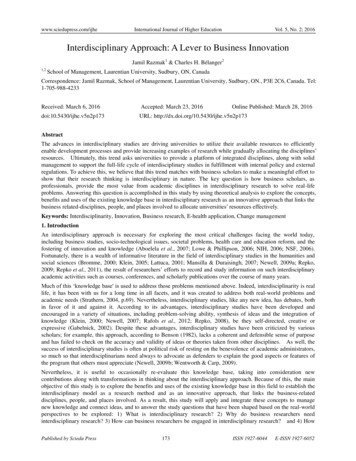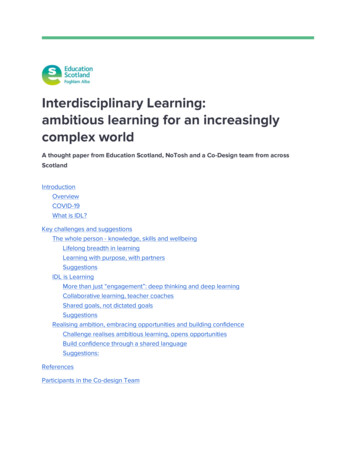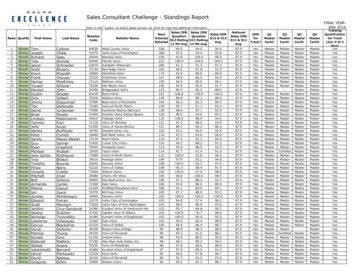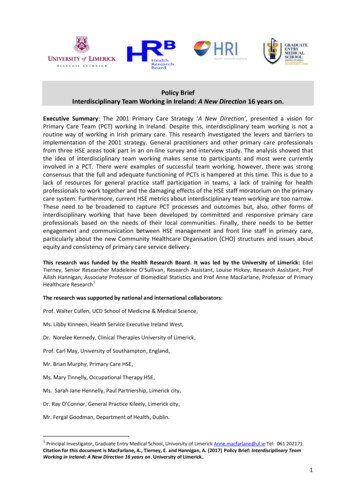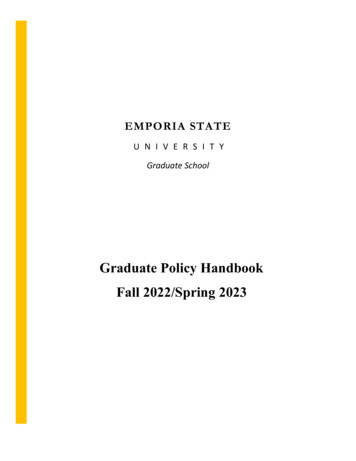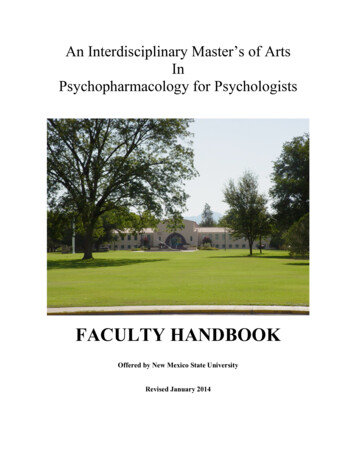
Transcription
An Interdisciplinary Master’s of ArtsInPsychopharmacology for PsychologistsFACULTY HANDBOOKOffered by New Mexico State UniversityRevised January 2014
TABLE OF CONTENTS1.2.3.4.Introduction . . . . . . . . . . . . . . . . . . . . . . . . . . . . . . . . . . . . . . . . . . . . . . . . . . . . . . . . . . . 3Philosophy of the New Mexico Psychologists Seeking Prescriptive Authority . . . . . 4History of the Southwestern Institute for the Advancement of Psychotherapy. . . . . 6Goals and Strengths of the SIAP/NMSU Interdisciplinary Master’s Degree of Artsin Psychopharmacology. . . . . . . . . . . . . . . . . . . . . . . . . . . . . . . . . . . . . . . . . . . . . . . . . . 75. A Template of Contents Domains Specified in the “Recommended Post-DoctoralEducation and Training Program in Psychopharmacology for PrescriptiveAuthority, Approved by the APA Council of Representatives August 9, 2009” . . . . 96. Governance Structure . . . . . . . . . . . . . . . . . . . . . . . . . . . . . . . . . . . . . . . . . . . . . . . . . . 117. New Mexico State University Graduate Catalog Description of Courses. . . . . . . . . 158. Grievance Procedures . . . . . . . . . . . . . . . . . . . . . . . . . . . . . . . . . . . . . . . . . . . . . . . . . . 219. Facilities. . . . . . . . . . . . . . . . . . . . . . . . . . . . . . . . . . . . . . . . . . . . . . . . . . . . . . . . . . . . . . 2710. Selection of Faculty . . . . . . . . . . . . . . . . . . . . . . . . . . . . . . . . . . . . . . . . . . . . . . . . . . . . 2811. Standards for Awarding Credit . . . . . . . . . . . . . . . . . . . . . . . . . . . . . . . . . . . . . . . . . . 3012. Ethical Guidelines. . . . . . . . . . . . . . . . . . . . . . . . . . . . . . . . . . . . . . . . . . . . . . . . . . . . . 3113. APPENDIX A – Recommended post-doctoral education and training program inpsychopharmacology for prescriptive authority approved by the APA Council ofRepresentatives August 9, 2009. . . . . . . . . . . . . . . . . . . . . . . . . . . . . . . . . . . . . . . . . . . 3314. APPENDIX B – Practice guidelines regarding psychologist involvement inpharmacological issues. . . . . . . . . . . . . . . . . . . . . . . . . . . . . . . . . . . . . . . . . . . . . . . . . . 4415. APPENDIX C - LeVine, E. & Foster, E. 2010, Integration of Psychotherapy andPharmacotherapy by Prescribing/Medical Psychologists; A Psychobiosocial Modelof Care. . . . . . . . . . . . . . . . . . . . . . . . . . . . . . . . . . . . . . . . . . . . . . . . . . . . . . . . . . . . . . . .622
INTRODUCTIONThe American Psychological Association advocates strongly for the increased involvement ofpsychologists in the primary health care sector, including providing psychotropic medications for their patients.In anticipation of the expanding role of psychologists to include prescriptive authority, the AmericanPsychological Association published American Psychological Association Recommendations for PostdoctoralTraining in Psychopharmacology for Prescriptive Privileges (APA Council of Representatives, August, 12,1996) based upon the work of a Blue Ribbon Committee, which was comprised of physicians, prescribingpsychologists, pharmacists and other experts in the field. After ten years of use of this document and thepassage of two prescriptive authority laws, the recommendations for post-doctoral training inpsychopharmacology were revised by the APA Council in the Fall of 2009. A copy of that revision is in theAppendix A.With the passage of New Mexico House Bill 170 in March 2002, New Mexico became the first state toallow properly trained psychologists to prescribe psychotropic medications for their patients. The passage ofHouse Bill 170 creates a compelling reason for New Mexico to offer psychologists post-doctoral training inpsychopharmacology modeled after the recommendations of the American Psychological Association, as wellas the requirements of the Prescribing Psychologists Law of New Mexico.3
Philosophy of the New Mexico PsychologistsSeeking Prescriptive AuthorityThe twelve psychologists in the first iteration of classes that completed coursework in 2002 developed thefollowing vision statement and action plan. Through self-evaluation andself-improvement, the current New Mexico University program strives to meet these goals.Vision StatementOur vision is to have competent mental health care accessible for all New Mexicans, including children,the poor, the elderly, and the silent sufferers – all of whom need and could benefit from our compassion,expertise, commitment and ever present advocacy on their behalf.Mission StatementPsychologists are trained in the empirical study and treatment of mental disorders. As our understandingof psychopathology evolves, so must our treatment. It is incumbent upon us to provide comprehensive, timelycare that is consistent with the nature of mental health disorders. As scientists trained in the study of behavior,we too can become trained and competent practitioners in the prescription of psychotropic medications. Totruncate our treatment plan to fit the exigencies of our patients’ lives is not the solution. The solution is tosimultaneously keep ourselves knowledgeable in the field of psychotherapy, to learn the common skill setnecessary for the competent administration of psychotropic medications, and to advocate for our patients’ wellbeing – including access to the full continuum of mental health treatment.Our society has extended our prescription authority to optometrists, podiatrists, and other non-medicaldegreed professionals. We doctoral level psychologists have shown the ability and determination to learn thecurriculum and accept the supervision needed to develop expertise. We psychologists can do that, as shown bythe Department of Defense Demonstration Project that trained 10 prescribing psychologists.Action PlanOur action plan is evolving and will be influenced by our Board of Examiners and the New MexicoPsychological Association.We believe the plan will incorporate the following:o That we will continue to train psychologists to be effective and safe prescribers of psychotropics;o That we develop protocol of treatment that will include: Obtaining relevant family, medical, and psychological histories; Ordering any unavailable baseline and follow-up laboratory tests that are necessary forthe safe monitoring of psychotropic medications;Collaborating with primary care physicians;Requesting medical records, including results of physicals, lab work, and lists ofmedications;4
Conducting ongoing, objective assessments of patient treatment gains; and Ensuring to the extent possible that patients receive comprehensive services, built uponthe therapist-patient relationship, so that patients can use their individual strengths tomake better choices in their lives.5
HISTORY OF THE COLLABORATION OF NEW MEXICO STATE UNIVERSITYAND THE SOUTHWESTERN INSTITUTEFOR THE ADVANCEMENT OF PSYCHOTHERAPYNew Mexico State University (NMSU) in conjunction with The Southwestern Institute for theAdvancement of Psychotherapy (SIAP) (a limited liability partnership corporation) has offered coursework inpsychopharmacology from 1999 through the present. SIAP is approved by the American PsychologicalAssociation to offer continuing education for psychologists. SIAP maintains responsibility for all programs thatit offers.In September 2012, NMSU allotted a full time faculty position devoted to RxP. This faculty member isa part of the Department of Counseling and Educational Psychology; and the department offers an APAaccredited doctoral level counseling psychology program. SIAP continues to offer continuing education for theNMSU psychopharmacology program as well as other continuing education for licensed prescribingpsychologists and continuing education for other practicing psychologists.New Mexico State University has offered seven iterations to date of classes in Psychopharmacology tostudents within the continental United States. While a majority of the psychologists participating in theprogram reside in New Mexico, the program has also provided education to psychologists from across theUnited States and Canada.Over 90 psychologists have completed the academic coursework from the NMSU program. Theprogram originated as a certificate program offering Professional Development Credit through New MexicoState University. It progressed to a post-doctoral Master’s Degree in 2008. An eighth iteration will commencein September of 2014.In 2008, SIAP/NMSU also began an international component. A class of twenty psychologists from theNetherlands completed the Interdisciplinary Master of Arts in psychopharmacology in the Summer of 2010.There are plans to initiate further international cohorts that would be available to students throughout Europeand Asia, with live classes held in Amsterdam, Netherlands.Over 30 psychologists who completed the SIAP/NMSU program have obtained a New Mexicoprescriptive authority license and are prescribing psychologists in New Mexico and elsewhere.6
GOALS AND STRENGTHS OF THE NEW MEXICO STATE UNIVERSITYINTERDISCIPLINARY MASTER’S OF ARTS IN PSYCHOPHARMACOLOGYThe SIAP/NMSU collaborative is academically very strong. It is modeled after the recommendations ofthe Blue Ribbon Committee that developed criteria for training for prescriptive authority, as well as the changesrecommended in the American Psychological Association’s 2009 revised recommendations; (APPENDIX A).The overall curriculum is divided into five primary units. The first unit provides an overview of thefoundations of psychopharmacology. Anatomy, physiology, and neuroanatomy are studied in detail. Studentswill participate in a live dissection of the brain and spinal cord. A second unit focuses on principles ofpharmacology. Students develop a sophisticated understanding of drug action and drug use, as well as learningabout specific classes of drugs and their effects and side-effects. The third unit is pathophysiology andevidence-based medicine. One weekend a month for nine months, students study a different system of thehuman body. They learn about the physiology and pathophysiology associated with that organ system, lab testsused to measure functioning, and how to conduct a physical exam. These classes are taught by physicians fromthe Family Practice Residency Program at the Memorial Medical Center in Las Cruces, New Mexico. Skills arepracticed within the clinic setting. By the end of this unit, students are skilled in conducting physical exams andhave a strong understanding of disease conditions and drug effects throughout the body. Unit four is clinicalpsychopharmacology. In this unit, students learn about the integration of psychotherapy andpsychopharmacology in the diagnosis and treatment of the varied mental disorders. In the last unit specialtopics include the treatment of children, elderly, ethnically diverse groups, pain patients, substance abusers,males and females. Special coursework is also provided regarding ethical and legal issues, with particularreference to the APA Code of Ethics, as well as the Practice Guidelines regarding psychologists’ involvement inpharmacological issues developed by Division 55 (American Society for the Advancement of Pharmacotherapy)Task Force on practice guidelines and adopted by the American Psychological Association Council in 2009;(APPENDIX B).A great emphasis in the coursework is for psychologists to develop a “best practice model,” so thatprescribing psychologists address access to care issues and create a new model based upon a psychobiosocialmodel that improves quality of care; (APPENDIX C).One of the strengths of the NMSU Master’s Degree program is that there is much opportunity for handson experience and direct interaction with professors. As explained, the unit in pathophysiology is taught withina Family Practice Clinic associated with Memorial Medical Hospital in Las Cruces, New Mexico. This allowsthe students to practice physical assessment skills in examining rooms, while the teachers are watching throughone-way mirrors. We also have an opportunity to participate in dissection of the brain.All professors are trained at the Doctoral level and include prescribing psychologists, psychiatrists,physicians, and clinical nurse specialists. In selecting faculty, experts are drawn from within the state andnationally.Students complete evaluations of each class. In addition, graduates of the program who are prescribingare surveyed to determine how well they believe the program prepares them to prescribe. This material isreviewed by the Training Director and the advisory council so the coursework is continuously modified forimprovement.7
NMSU has also been involved in providing continuing education in “best practice” psychotherapy topsychologists and other professionals. For example, in April of 2010 SIAP/NMSU sponsored a symposiumattended by eighty licensed psychologists and graduate students in counseling psychology, social work, nursing,physicians from the Family Practice Residence Center, and twenty psychologists from the Netherlandsregarding critical access to care issues around the world.NMSU provides coursework that is of cutting edge significance to the field of psychology and crucial toNew Mexico psychologists wishing to become prescribing psychologist in order to further access to quality carein New Mexico. In sum, coursework is rigorous and taught by experts in the field so that participants’knowledge, critical inquiry, and judgment are enhanced.8
A TEMPLATE OF CONTENT DOMAINS SPECIFIED IN THE“RECOMMENDED POST-DOCTORAL EDUCATION AND TRAINING PROGRAM INPSYCHOPHARMACOLOGY FOR PRESCRIPTIVE AUTHORITY, APPROVED BY THE APACOUNCIL OF REPRESENTATIVES AUGUST 9, 2009”Mapping ChartContent Mapping ChartI. Basic ScienceA. Anatomy & PhysiologyB. BiochemistryII. NeurosciencesA. NeuroanatomyB. NeurophysiologyC. NeurochemistryIII. Physical Assessment/LabsA. Physical AssessmentB. Lab and Radiological AssessmentC. Medical TerminologyIV. Clinical Medicine/PathophysiologyA. PathophysiologyB. Clinical MedicineC. Differential DiagnosisD. Clinical CorrelationsE. Substance-Related DisordersF. Chronic Pain ManagementV. Pharmacology and PsychopharmacologyA. PharmacologyB. Clinical PharmacologyC. PharmacogeneticsD. PsychopharmacologyE. Developmental PsychopharmacologyF. DiversityVI. Clinical PharmacotherapeuticA. Combined TherapiesB. Computer AidsC. PharmacoepidemiologyVII. ResearchA. Methodology and DesignB. Interpretation of ResearchC. Regulatory ProcessesVIII. Professional, Ethical and Legal Issues9Course or Course Module:1 2 3 4 5 6 7 8 9 10x xx x xxxxxxx xxxxxxx xx xx xxxxxxxxxxx xx xxxxxxxxx xx xx xxxxx xx xxx xxx xx xx xx xx xxxxxxxxx xx xxxxx
A. Existing Law and StandardsB. Pharmaceutical Industry1. Conflict of Interest2. Marketing Practices3. Critical ConsumerxxxxxLEGEND:NMSU Course Catalog NumberCEP 801CEP 802CEP 803CEP 804CEP 805CEP 806CEP 807CEP 808CEP 809/SPED 495CEP 810/SPED 501Module # in Chart Above1234567891010
GOVERNANCE STRUCTUREThe Acting Training Director of the NMSU Interdisciplinary Master’s Degree of Arts in Psychopharmacologyis Elaine S. LeVine, Ph.D., ABMP. Dr. LeVine, prescribing psychologist, spearheaded New Mexico’s efforts topass the first Prescribing Psychologist Act in the United States. She was the first psychologist in New Mexicoto obtain a license to prescribe psychotropic medications for her patients. She maintains a private practice inLas Cruces, New Mexico and was the medical consultant to Pasos Adelante, a mental health clinic addressingan underserved, impoverished population in southern, rural New Mexico. In addition to her clinical work, sheis the Training Director of the Southwestern Institute for the Advancement of Psychotherapy/New Mexico StateUniversity Master’s degree program, which is training psychologists from New Mexico and across the UnitedStates, Canada, and in the Netherlands in psychopharmacology. Dr. LeVine holds a part-time college professorposition in the Counseling and Educational Psychology Department of New Mexico State University. Herpublications include four books and numerous articles on child therapy, law and mental health, cross-culturaltherapy, and psychopharmacology. She is also the consulting editor for Professional Psychology: Research andPractice. She is a fellow of the American Psychological Association (APA) through which she received 2003APA Presidential Citation, Carl F. Heiser Award, Division 31 Outstanding Psychologist Award, Division 55State Contribution to Psychotherapy Award, Division 55 National Visionary Leadership Award, and Division47, Joan D. Black award.The Training Director of the NMSU program is supervised by the Department Head of the APAaccredited counseling psychology program of New Mexico State University. The present Department Head isElsa Arroyos, Ph.D. The Training Director works with a program committee comprised of faculty fromNMSU’s Counseling Psychology, Nursing and Special Education departments. The present program committeeis Professor Michael Waldo, Department of Counseling and Educational Psychology, New Mexico StateUniversity, Jonathan Schwartz, Ph.D., Associate Dean, College of Education, Marlin Hoover, Ph.D.,College Professor, Department of Counseling and Educational Psychology, New Mexico State University,Kathleen Chinn, Associate Professor of Special Education, New Mexico State University.In addition, the Training Director of the NMSU Interdisciplinary Master’s Degree of Arts degree inPsychopharmacology also works with an advisory board. Key leaders in the field serve on this advisory board.The board members for 2014 are listed on a subsequent page.11
GOVERNANCE STRUCTURENEW MEXICO STATE UNIVERSITYInterdisciplinary Master’s Degree of Arts in Psychopharmacology for Psychologists Advisory BoardPrescribing PsychologistNMSU LeadershipDOD Prescribing PsychologistPhysiciansTrainingDirectorNMSUCentral AdministrationAssociateDean of theGraduateSchoolDean ofCollege ofEducationDean nt HeadOf Counseling presentativeSpecial Education12
ADVISORY BOARDNameDegreePh.D.Elaine S. LeVineElsa ArroyosJonathan SchwartzElaine FosterThomas ThompsonPh.D.Ph.D.Ph.D.Ph.D.M.D.Don FinebergJohn AndazolaJuanita MendozaHannanM.D.Ph.D.CurrentAffiliationActing Training Director andDirector of the SouthwesternInstitute for the Advancementof PsychotherapyOrganizationalContribution to ProgramPlanningTraining DirectorActing Department Head ofCounseling andEducational Psychology, NewMexico State UniversityFaculty liaison; helps establishcurriculum, monitorsadministrative proceduresthrough UniversityAssociate Dean of the Collegeof EducationNew Mexico State UniversityAdministrative liaison offeringoverall program advice,assistance in seeking postdoctoral Master’s statusOne of the original prescribingpsychologists from theDepartment of DefenseDemonstration ProjectMember of the New MexicoBoard of PsychologistsExaminers and PrescribingPsychologist of New MexicoPsychiatrist in Private Practicein New Mexico and RxPAdmissions Committee of theNew Mexico Board ofPsychologistsDirector of the FamilyPractice Residency program inLas Cruces, NMDean of Distance Education,NMSU13Overall review of curriculumOverall review of curriculumOverall review of curriculumAdvice about faculty andreview of curriculumconcerning evidence-basedmedicineOverall review of curriculumand particular guidance onadministrative matters
HOW NMSU AND SIAP INTERFACEThe Southwestern Institute for the Advancement of Psychotherapy is a free-standing LLC developed forthe explicit purpose of offering continuing education specializing in post-doctoral psychopharmacology. Thestaff of SIAP works collaboratively with faculty and administrators from New Mexico State University toassure quality of its post-doctoral Master’s Degree program and to provide continuing education. SIAP alsocollaborates with the New Mexico Psychological Association, the State Psychologists’ Association (anassociation for licensed, practicing prescribing psychologists), the Las Cruces Public Schools, the Departmentof Counseling and Educational Psychology at New Mexico State University, and others to jointly sponsorcontinuing education for psychologists.In addition, the Training Director of SIAP meets frequently with members of the advisory board aboutthe existing program and means for constant evaluation and improvement.14
NEW MEXICO STATE UNIVERSITYGRADUATE CATALOGDESCRIPTION OF COURSESfromNew Mexico State University Graduate Catalogue15
COUNSELING and EDUCATIONAL PSYCHOLOGYDepartment website: http://education.nmsu.edu/cep(575) 646-2121cepdept@nmsu.eduThe courses listed below are from the NMSU Catalog. For a complete list of all courses offered by theCounseling and Educational Psychology Department, please go to the website link listed.CEP 801. Introduction to Psychopharmacology for Psychologists I 3 cr.This course is an introduction to physiology and an overview of gross and microanatomy, with a focuson gross, micro, and chemical anatomy of the nervous system. By the end of the course, psychologistswill have an up-to-date understanding of human psychology, anatomy, and neuroanatomy. Prerequisites:Doctorate in psychology or consent of instructor.CEP 802. Introduction to Psychopharmacology for Psychologists II 3 cr.Principles of organic chemistry and human biochemistry necessary for the understanding ofpsychopharmacology are discussed and related to the major transmitter systems and dynamics oftransmission. By the end of the course, students will have an up-to-date understanding of biochemistryon which to base further didactic study in psychopharmacology. Prerequisites: Doctorate in psychologyor consent of instructor.CEP 803. Clinical Psychopharmacology I 3 cr.This course begins with an introduction to the scope of pharmacology; pharmacoepidemiology, ethical,and legal issues (informed consent, State and Federal regulation of drugs and prescribing, sources ofdrug information and computer aids) and continues with the principles of pharmacokinetics andpharmacodynamics as they relate to the use of psychotropic medications. It concludes with anintroduction to the treatment of anxiety disorders from a biopsychosocial model of care with specialemphasis on psychopharmacology for anxiety disorders. Prerequisites: Doctorate in psychology orconsent of instructor.CEP 804. Clinical Psychopharmacology II 3 cr.This course is a thorough investigation of the diagnosis and treatment of affective disorders from abiopsychosocial model of care. Particular emphasis is given to psychopharmacological treatment ofdepressive disorders and bipolar disorders. Prerequisites: Doctorate in psychology or consent ofinstructor.CEP 805. Clinical Psychopharmacology III 3 cr.This course is an intensive study of the treatment of psychosis from a biopsychosocial model of care.Special consideration is given to: first, second and third generation antipsychotic drugs and theirpharmacology and clinical uses; neurological and metabolic disorders associated with antipsychotic use;and appropriate use of antipsychotics in children and the elderly. Special attention is then given to childand adolescent psychopharmacology, including drugs used in pregnancy and lactation, teratogenicity,embryotoxicity, developmental disorders, conduct disorders, ADHD, and special considerations in useof approved drugs in children. Prerequisites: Doctorate in psychology or consent of instructor.CEP 806. Pathophysiology for Psychologists I 3 cr.This course is an introduction to human clinical physical assessment, history taking, charting, andlaboratory testing and neuroimaging. An important emphasis is in functional neuroanatomy anddiagnosis and assessment of neurological disorders; role of different components of human nervoussystem in health and disease; stroke, seizures, and movement disorders (chorea, athetosos, dystonias,dyskinesias, Parkinsonism, akathesia, iatrogenic neurological disorders). Prerequisite: Doctorate inpsychology or consent of instructor.16
CEP 807. Pathophysiology for Psychologists II 3 cr.Physical assessment and pathophysiology of the cardiovascular system is studied in depth: structure andfunction of the heart and major blood vessels; innervation of the heart and vessels; electrocardiogram;components of blood; lymphatics; and physical assessment of cardiac function. The physical assessmentand pathophysiology of eyes, ears, nose, and the immune system are studied in depth; anatomy andphysiology of special senses; assessment of cranial nerves and sensory function; immune function andpsychoimmunology. The physical examination and pathophysiology of the chest and pulmonary systemand its relationship to the cardiac system is also studied. Prerequisites: Doctorate in psychology orconsent of instructor.CEP 808. Pathophysiology for Psychologists III 3 cr.This course continues with an in-depth study of the chest and pulmonary system: pulmonary functionand assessment; respiratory exchange and respiratory involvement in acid: base regulation, disorders ofrespiratory function. The physical assessment of pathophysiology of the gastrointestinal system isdiscussed in depth: digestion, absorption and excretion of drugs and nutrients from the GI system;disorders of GI function; hepatic function; innervation of GI tract; endocrine and exocrine functions ofGI system; physical assessment of GI function. The functions and pathophysiology of the male andfemale reproductive system, endocrine system, and renal system are discussed as they relate topsychopharmacology. Prerequisites: Doctorate in psychology or consent of instructor.CEP 809. Psychopharmacological Treatment in Special Populations I 3 cr.The psychopharmacology of several special populations are discussed in detail in this course. Geriatricpsychopharmacology includes: geriatric physiology; cardiac, renal, hepatic changes with aging;pharmacokinetics/dynamics in the elderly; cognition enhancers in Alzheimer’s and other dementias.Special treatment of personality disorders, eating disorders, the importance of racial, ethnic, and genderdifferences and culturally sensitive practice is presented with applications. Pain managementpsychopharmacology is over-viewed, including: pharmacology of opioid and non-opioid analgesics;pain syndromes; acute and chronic pain; headache; pharmacological and non-pharmacologicalapproaches to pain management; pharmacology and actions of abused substances: acute effects,withdrawal, biochemistry of tolerance and dependence, brain central reward pathways. Prerequisites:Doctorate in psychology or consent of instructor.CEP 810. Psychopharmacological Treatment in Special Populations II 3 cr.The pathophysiology and treatment of substance use disorders from a biopsychosocial model ispresented. Issues of medical comorbidity are studied: psychopharmacological treatment in the medicallycompromised patient, including case studies and review of comprehensive treatment models; mentaldisorders due to a general medical condition and/or adverse drug reactions; and referral practices tospecialists. Diagnostic rating scales and psychiatric instruments of use to the prescribing psychologistare presented. The course ends with an integration of psychotherapy and pharmacotherapy, includingethical issues such as the right to refuse treatment, treatment compliance/adherence, risk management,and the role of the medical psychologist in the modern, integrated healthcare system. Prerequisites:Doctorate in psychology or consent of instructor.CEP 811. Supervised Experience in Psychopharmacology I 3 cr.In this applied course, students employ their knowledge of psychopharmacology in treatment setting.Students will participate in the treatment of 50 patients for a minimum of 200 hours under thesupervision of a physician. Restricted to Post-Doctoral Master’s Programs. Prerequisite: Doctorate inpsychology or consent of instructor.CEP 812. Supervised Experience in Psychopharmacology II 3 cr.Continuation and completion of supervised experience in CEP 811. Students will participate in thetreatment of 50 patients for a minimum of 200 hours under the supervision of a physician. Restricted toPost-Doctoral Master’s Program. Prerequisite: Doctorate in psychology or consent of instructor.17
FACILITIESClasses are taught in specially equipped academic classrooms at New Mexico State University in whichlectures can be projected for distant education and stored professionally for future use. The classes inpathophysiology and physical assessment are taught in a medical clinic.Classrooms are handicap accessible. The Training Director maintains a personal relationship with eachpsychologist participant so that any necessary special provisions can be made. NMSU does, of course, allowthose with auditory, visual, or other impairments, to make use of any equipment or personnel needed for theirsuccessful study.The lecturer and Training Director (or an assistant) are present during class. Only enrolled students andspecial invited guests may attend. The Training Director reviews copies of all written materials before they aredistributed to students. Most material is theoretical and in those cases issues of confidentiality are not ofconcern. The program makes extensive use of interactive cases. In all use of case material, anonymity ismaintained and no identifying features are allowed.18
FACULTYThe core faculty is comprised of prescribing psychologists, psychopharmacologists, physicians from theFamily Practice Residency Center located in Las Cruces, New Mexico. Guest professors are national expertswith specialized research and applied skills in treating particular disorders and populations. Facultyincludes:Lia Billington, Ph.D., Child psychologist and prescribing psychologist, currently practici
An Interdisciplinary Master's of Arts In Psychopharmacology for Psychologists FACULTY HANDBOOK Offered by New Mexico State University Revised January 2014
